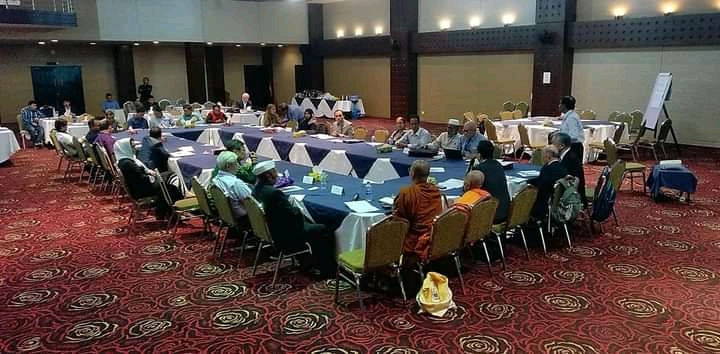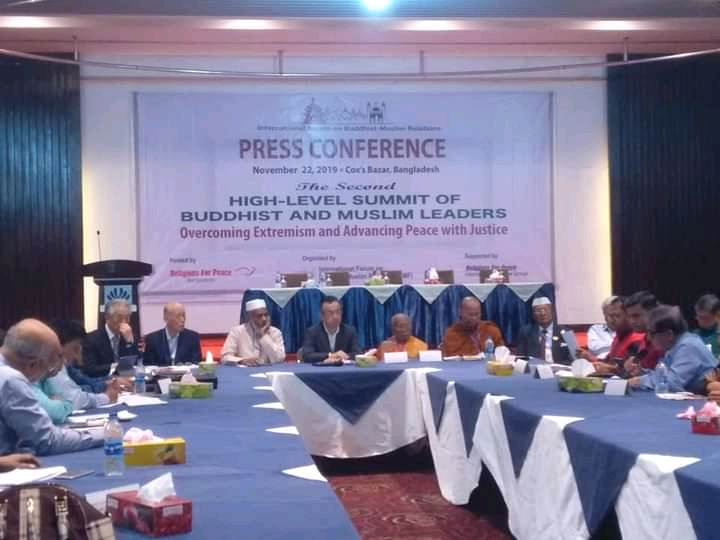By -Sanat Kumar Barua, EC Member, International Network of Engaged Buddhist (INEB) and General Secretary, Atisha Dipankar Peace Trust Bangladesh , E-mail: sanat.ads@admin


The Second High level Buddhist and Muslim Leaders Summit was held on November 21-22, 2019 in Cox’sBazar, Bangladesh. Over 20 Buddhist and Muslim leaders from across the South and Southeast Asia to advance the Yogyakarta Statement of shared values and commitments to overcome extremism, advance societal peace with justice, to serve as a platform for interreligious and inter-religious initiatives in education & advocacy, rapid action for conflict prevention, solidarity visit in the event of conflict, constructive engagement and strategic common action, develop for positive messaging particularly via social & alternative media, current needs and efforts for Buddhist- Muslims across the region. The summit was hosted by Religion for Peace (RFP), organized by International Forum on Buddhist-MuslimRelations (BMF), In partnership with the International Network of Engaged Buddhists (INEB), International Movement for a Just World (JUST), Persyarikatan Muhammadiyah (PM) and The Network for Religious and Traditional Peacemakers.
In the summit the Buddhist- Muslim leaders also reaffirmed solidarity with Rohingya refugees and to advance one of the seven shared values embodied in the Yogyakarta Statement on ‘ Living in Harmony with the Environment- by cutting of single use of plastics ’ with a focus on Bangladesh as a key outcome for the current needs. A task force was formed to implement the outcomes working for a sustainable and a harmonious future.
South and Southeast Asia is one of the most religiously diverse regions in the world. The region is important due to the rising of religious nationalism, economic power and shifting of the geopolitical landscape. In the region, among the various problems, environmental issues are the most concerning for peace and sustainability. It is a global threatening issue also. The overall situation has reached to such an extent that it is not impossible to completely reduce it, may be possible to minimize it if there are joint efforts by the Buddhist- Muslim communities with ethical, moral and spiritual undergirding.
Environmental ethics in Islam can summarized as just three precepts- ‘ Do what is right, Forbid what is wrong and Act with moderation at the time’. In Buddhism- human excessive Loba, Desha, Moha i.e, greed, delusion, and attachment are the main causes of suffering on our planet. The main issue in environmental degradation is due to climate change i.e, global warming, soil-water-air pollution, biodiversity, ecosystem losses and many more unethical human activities. South, Southeast Asian countries like Bangladesh, Sri Lanka, Maldives, Philippines and other countries suffer from loss of homes and personal property, health hazards, increase in violent conflicts and the foregone income that accompanies climate change induced disasters and instability. Thus environmental issues cannot be separated from social-justice.
Now, plastic products become one of the major pollutants in this region. Plastic is inert and hard to degrade. So, it becomes a toxic techno-waste that has severe polluting effects on the earth’s biodiversity. National Geographic reports that plastic kills millions of marine and land animals every year. Experts have found that we are all consuming microplastics in the food supply, which may cause damage to our digestive and reproductive systems and eventually lead to an early-death. Plastic products are expanding worldwide. A report says, plastic contributes to the greenhouse at every stage of it’s cycle, from its production to it’s refining and the way it is managed as a waste product. We produce over 320 million tons of plastic globally every year, almost half is single- use of plastic, useful for minutes, then destined to pollute our planet and oceans for centuries. Its production must end now and find out it’s environmental friendly alternatives.
A report from the summit’s host country shows, Bangladesh is the most populated Muslim country in South Asia. About 170 millions people live here in 147,5070 square kilometers. It also adds 1.1 millions Rohingya refugees with her. For overpopulation the country loses a huge number of natural forests , resources for livelihood. On the other hand, climate change causes natural disasters, health hazards, sea level rising ultimately causing mass internal migration, contaminating salty water with groundwater, eventually barren food production, damaging natural mangrove forests and many others climate injured incidents. Here, it is mentioned, Bangladesh emits only 0.3% of the world emission but suffers most due to the environmental crisis and becoming the most vulnerable country in the world. Another report says Bangladesh generates around 3,000 tons of plastic waste everyday. About 36% of plastic waste is formally recycled, 39% is dumped in landfills and the remaining 25% leaked into the environment, eventually flowing to the Bay of Bangle through the rivers. And also generates around 3,744 tons of single use plastic produced annually, approximately 80-85% are discarded being used only once. Single use plastics include drinking straws, plastic cotton buds, sachets, food packaging and plastic bags. It takes a minimum 10-200 years to decompose the single use of plastics. Like Bangladesh, South-Southeast Asian People in other countries are suffering from plastic pollution. So, we appeal to the Buddhist-Muslim communities to raise massive faith based approaches working for environmental peace and harmony and it is now urgently necessary to cut of plastic products specially single use of plastics from the societal life .
In South, Southeast Asian countries people are of high religiosity where Buddhist-Muslim leaders and other religious actors have wide influence. Here religion plays a central role in the daily lives of many people and in the broader social dynamics. Religious actors often utilize ‘value based’ approaches which have potential for wider application. So for a just peaceful South-Southeast Asia countries, we humbly request to come together as an interfaith initiatives to address the complex and combined challenges of ‘ Living Harmony with the Environment’ because we have unlimited desire, yet few resources, the destruction we cause now will have a long term, everlasting effect. And most of all, the environment isn’t only for us human’s but for all species on earth. As we only have one mother earth. We seek to encourage healing in a world struggling for equality, justice and well-being. We shall continue to do in good faith as a sign of commitment to our religious teachings and shared love and compassion to all living beings.


0 Comments